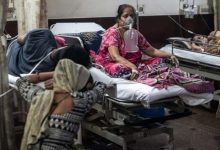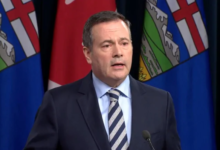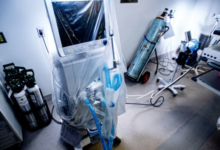Plastic surgeons lending ventilators to help with COVID-19 outbreak
University of Toronto professor Peter Adamson has been following the COVID-19 news, crunching the numbers related to Ontario’s health system, and decided private cosmetic surgeons should step up and help.
“It became quite apparent to me that our health-care system in Ontario, and most jurisdictions, is really going to be, if not overwhelmed, they’re going to be pushed absolutely to its limits,” the professor of facial plastic and reconstructive surgery said.
Adamson, a former long-time plastic surgeon who is still active in medical associations, drafted a letter urging private surgeons to donate medical equipment including surgical gowns, masks, gloves and ventilators. A more inclusive letter is in the works to reach all cosmetic surgeons in Ontario.
The majority of private clinics are closed or have stopped doing cosmetic surgery, so the machines are sitting idle.
“If we don’t get those ventilators some way or another then there will have to be very difficult choices being made down the road, perhaps not very long at all, as to who gets a ventilator and who does not get a ventilator,” Adamson said.
He said it’s difficult to say exactly how many ventilators private clinics can offer, but likely a few hundred more.
1,300 ventilators in Ontario, 500 in surplus
There are 1,300 ventilators in Ontario, according to a health ministry spokesperson. The province has received the 300 additional ventilators it ordered to add to the 210 in reserve. Those 510 ventilators are not located at specific hospitals but are now being put to use, according to the province’s Chief Medical Officer of Health Dr. David Williams.
During news conferences Saturday, Dr. Williams and Minister of Health Christine Elliott didn’t say how many ventilators the province would need in order to be equipped for a worst-case scenario.
A recent study by some of Ontario’s leading medical researchers found the province could run out of ventilators in less than 40 days. Researchers said most of the ventilators in Ontario are in use, while the ministry said the number matches the need now.
Williams said between four to six people with COVID-19 were on ventilators Friday.
“That can change very much by the hour,” he said.
Elliott said the province is “fortunate” the private sector is willing to lend ventilators and said they’re working on the logistics of getting them to hospitals.
“That is active work right now within my ministry and that will be another great source of ventilators,” she said.
The province is asking manufacturing companies to retool production to make medical equipment that’s in short supply, like ventilators. Premier Doug Ford announced a new website, Ontario Together, which will identify items that are needed, solicit ideas from companies and help them work with the province to address medical shortages amid the COVID-19 outbreak.
Adamson said he hopes ventilators from the private sector that are available now can help fill the gap while new ones are being manufactured.
Surgeons hope private ventilators can be deployed in days
Ontario’s private surgeons are in contact and are hoping to have a plan in place in the coming days to coordinate how many ventilators they can lend and how to get them to hospitals.
“They’re delicate machines and they’re not easily portable,” Dr. Jamil Asaria said. “We can’t put these into the back of our car and drop them off.”
Asaria is the Canadian region director for the American Academy of Facial Plastic and Reconstructive Surgery and he said the equipment will also need to be checked and certified.
He’d ideally like the ventilators to be in hospitals by mid-week.
He said most private cosmetic surgery clinics have between one and four ventilators, which cost $100 thousand on average each. They’re also in contact with dentists and veterinarians to lend equipment.
Asaria is also the founder of Face Toronto and recently purchased a new ventilator for his clinic, which he is offering up.
“That’s really the least we can do,” he said. “It may be a drop in the bucket, but one machine may support one person to stay alive.”
CBC








Redes Sociais - Comentários